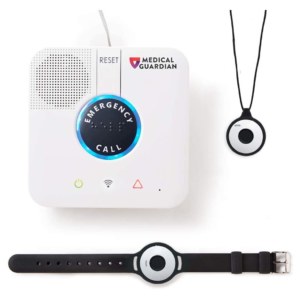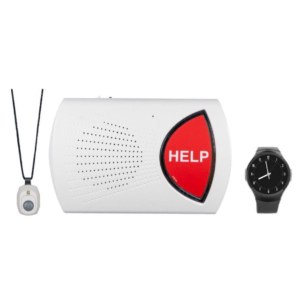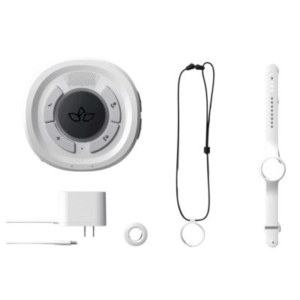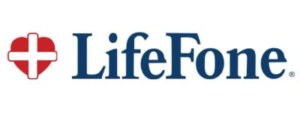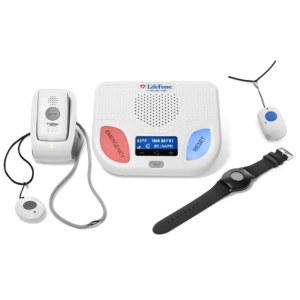Best Cellular Medical Alert Systems
AgingInPlace.org keeps our resources free by working as an affiliate partner with some companies mentioned on our site. These partnerships or the commission we may earn do not affect our opinions or evaluations of the products we mention. Our reviews are solely based on our research methodology and from input from our AgingInPlace.org Advisory Board. Learn more about our ad policies.
Best Cellular Medical Alert Systems
Products carousel
Medical alert systems can keep you safe inside your home in case of an injury or medical emergency, making them an excellent safety feature for older adults who want to age in place. However, not everyone enjoys sitting in their home all the time, which is one of the main features of in-home medical alert systems—remaining in range of the base unit. Are you wondering if there’s an option for you that can ensure your protection and a reliable connection even if you’re not near your medical alert system?
Cellular medical alert systems are mobile medical alert systems that allow you to call for help inside and outside the home. Unlike an in-home alert system, they don’t need to be plugged in and can be with you wherever you go.
Key Takeaways
- Cellular medical alert systems work in and out of the home, letting you travel freely.
- Cellular medical alert systems don’t require a landline to connect you to help, thanks to nationwide coverage and cellular providers.
- Many cellular medical alert systems come with caregiver apps, are water-resistant, and have GPS tracking for up-to-date location information.
- Battery life for cellular medical alert systems can vary but need recharging often.
Overview
Cellular medical alert systems are mobile medical alert systems that allow you to call for help inside and outside the home. Unlike an in-home alert system, they don’t need to be plugged in and can be with you wherever you go.
Cellular medical alert systems often come with extra features, like a pedometer. Still, the main reason seniors buy them is for the safety net it provides while they’re living their lives to the fullest outside of their homes.
Cellular medical alert systems can work outside your home because of cellular coverage. In the same way your smartphone gives you directions when driving or walking somewhere, a mobile medical alert system can make calls 24/7 in an emergency. There are models with a two-way speaker system, allowing you to speak directly to a monitoring center agent who can send a first responder right away. However, many cellular medical alert devices can automatically reach out to a set group of family members, caretakers, and monitoring center agents with the simple push of a button.
Pros:
- No installation or activation fees because it’s not installed anywhere in the home
- Some devices also come with caretaker apps, allowing caretakers to communicate with seniors and track their location
- Many devices have monthly plans with no contracts
- Works almost anywhere, thanks to cellular data coverage
- Lightweight and discreet (can be worn as a pendant or bracelet)
- Works for seniors who don’t have a landline
Cons:
- Battery be recharged daily to weekly
- Monthly plans can be expensive
- Extra features, such as automatic fall detection, can sometimes cost extra
- Usually has an initial equipment fee
Best Cellular Medical Alert Systems
- Medical Guardian: Best customer service
- Bay Alarm Medical: Best for a tight budget
- Aloe Care Health: Best for simplicity and durability
- LifeFone: Longest-lasting battery life
Product Reviews
Medical Guardian, one of our top picks, proudly maintains one of the highest overall customer experience ratings for medical alert systems and has a TMA Five Diamond-certified monitoring center. It has a variety of packages available to fit you or your loved one’s needs, including two types of cellular medical alert systems—the Mini Guardian and the Mobile 2.0. You wear it as a clip, pendant, or on your wrist.
Medical Guardian’s cellular medical alert devices cost the same amount but have different features, making them customizable for you or your loved one’s safety.
Pros
-
Both cellular medical alert devices have a battery life of five days
-
Fall detection feature
-
Mini Guardian is available in three colors
-
TMA Five Diamond Certification for its excellent response center performance
-
Can operate using cellular service and Wi-Fi
-
Overall high rating in customer satisfaction
-
Free shipping
-
Features the MyGuardian online customer care portal, which allows location tracking and communication with care circles
-
MGMove Smartwatch option
Cons
-
Fall detection is an extra cost of $10 per month
-
The Mini Guardian and Mobile 2.0 have a one-time equipment fee of $124.95
-
No risk-free trial period or warranty
See Our Full Medical Guardian Review.
After careful consideration and research, we’ve determined Bay Alarm Medical to be your most budget-friendly option for a cellular medical alert system. The cheapest on-the-go medical alert system is the Mobile Lite at $29.95 per month. Compared to other medical alert device prices, Bay Alarm Medical is on the lower end. Bay Alarm Medical also features mobile and in-home medical alert system package bundles, as well as the SOS Smartwatch if pendants aren’t your style.
Although they have an upfront equipment cost ranging from $79.95-$159.95 depending on your plan, the overall savings for such a reliable alert button will be noticeable after a year. If you decide it’s not for you during your first 30 days, you can send it back at no charge.
Pros
-
End-to-end 4G LTE coverage is offered with each device
-
Features a GPS-powered Caregiver Tracking app, included with all mobile plans
-
Optional pendant-free fall detection notifies selected contacts if there’s a fall
-
Mobile monthly fee starts at $29.99
-
No contracts
-
Risk-free 30-day trial and free shipping
-
Overall excellent customer review average on Google
-
Price-lock guarantees monthly costs never rise
-
Can be worn with a pacemaker on the same belt
Cons
-
Mobile Lite and Plus aren’t pendants, so they may be easier to lose
-
All mobile devices have a battery life of only 72 hours
-
30-day trial and free shipping offer only available on quarterly and annual plans
-
SOS Smartwatch plan does not include automatic fall detection
-
$79 upfront equipment fee (Mobile Lite and Plus)
-
$159 upfront equipment fee (SOS Smartwatch)
See Our Full Bay Alarm Medical Review.
If you’re in the market for a cellular medical alert system without a lot of extra features, the Aloe Care Mobile Companion is your best bet. With a monthly fee of just $24.99, this medical alert system pairs perfectly with the Aloe Care in-home device but can be used independently, thanks to its cellular data technology. Keep in mind—there is an upfront hardware cost of $99.99.
However, there’s no extra cost for the Mobile Companion’s fall detection capabilities, but the official Aloe Care Health site indicates it can’t guarantee it will work for every fall–this is common for most medical alert companies. The cellular medical alert system does have multisensory feedback, a unique feature for a device as compact as this.
Pros
-
Multisensory feedback
-
Automatic fall detection at no extra cost
-
Cellular location detection
-
Help is available 24/7
-
Worn around the neck, so it’s easy to keep track of
-
Caregiver app offers real-time updates to family, check-in calls, and notifications if the monitoring center is contacted
-
Two-way talk capability
-
Monthly fee starts at $24.99; no contract necessary
-
30-day money-back guarantee
-
Water-resistant
Cons
-
Only runs on AT&T cellular data, where available
-
Has a one-time equipment fee of $99.99
-
Website does not indicate battery life
See Our Full Aloe Care Health Review.
If you’re the adventurous type or someone who forgets to charge their devices at night, a LifeFone device might be what you’re looking for. Along with its 24/7 monitoring center, LifeFone also has a 24/7 customer service center. The customer care team is readily available to answer any questions you may have about your On-The-Go VIP and VIPx devices.
The VIP has a whopping 30-day battery life, while the VIPx has a 16-day battery life. LifeFone also provides cellular coverage for these devices under two providers: AT&T and Verizon. The VIP and VIPx also have automatic fall detection, but it’s not enabled unless you add it to your device for an extra $5 a month.
Pros
-
24/7 customer service center in addition to a care response center
-
Two-way voice communication
-
VIP battery lasts 30 days, and VIPx lasts 16 days
-
Works with Verizon and AT&T cellular coverage provided by LifeFone
-
Works with Wi-Fi
-
30-day money-back guarantee
-
No activation or equipment fees
-
In addition to calling, VIP device provides customizable text and email notifications
Cons
-
VIPx fall detection for an additional $5 a month
-
Optional VIPx Caregiver mobile app for an additional $8 a month
-
High monthly subscription fee
-
Free shipping only on quarterly and annual plans
See Our Full LifeFone Review.
Other Medical Alert Systems that Didn’t Make the List
Life Alert
Although this is the most well-known brand of medical alert systems, Life Alert is also one of the priciest. Unlike the other medical alert systems we listed above, Life Alert requires a three-year contractual commitment that can’t be canceled unless there are extreme circumstances. In addition to the higher price, information about Life Alert’s medical system features is hard to find on their website, so we couldn’t provide much insight for you to consider when weighing your options. Here is our take on what are the best Life Alert alternatives.
Philips Lifeline
AARP offers a 15 percent discount on Philips Lifeline medical alert system’s monthly fee, free shipping, and free activation for members. Philips Lifeline has a reputation in the medical alert system market because Lifeline was the first medical alert provider in North America (it was acquired by Philips in 2006), and its products have mostly positive reviews. However, we don’t recommend its cellular medical alert system, the “On the Go”, because of its high monthly subscription rate of $49.95 in addition to the $99.95 hardware fee.
How to Choose the Best Cellular Medical Alert System for You
When shopping for a cellular medical alert system, it’s important to consider your specific situation and needs. There are so many devices available on the market because everyone has a different lifestyle, no matter how old they are, and these devices are made to fit those lifestyles.
Some devices have a longer battery than others. Some have extra features like a pedometer or text messaging. Some are waterproof, while others are water-resistant. Some only have a help button and nothing else. You have to consider whether or not these are features that you will be comfortable with.
Of course, affordability will always be the most important factor when deciding which medical alert system will suit you best but be careful not to trade off price for necessary features like automatic fall detection or a two-way communication system.
Things to Consider When Shopping for a Cellular Medical Alert System
- 24/7 emergency response
- What if you experience an emergency medical situation at night? Do you travel a lot? Having a 24/7 emergency response feature would be beneficial because help will always be available to you.
- Equipment fees
- Equipment fees are an upfront, one-time cost. There is no installation fee or activation fee to go with it, but it’s important they don’t break the bank at your initial purchase.
- Monthly rates
- Many devices also feature quarterly or yearly rates, but monthly rates are the most popular way to pay. Monthly rates are key in determining if the cellular medical alert system you’re looking for is affordable.
- Two-way talk
- Do you prefer hitting a button and letting the system call your emergency contacts? Or would you like to speak to another person over the phone after you hit the button? Your communication style is a key factor to consider when shopping for a cellular medical alert system.
- Caregiver apps
- Caregiver apps benefit both you and your caregiver. You are given safe independence outside of the home thanks to your cellular medical alert device, and your caregiver gets to rest easy knowing they can check on you any time using the app.
- Quick response time
- If there’s a medical emergency, you don’t want a slow response time. The best medical alert devices have a fast response time for immediate assistance.
- Water resistance
- Cellular medical alert systems aren’t just for traveling outside the home. Water-resistant devices are perfect if you worry about falling in the bathroom or shower.
- Extended battery life
- If you love long road trips or forget to charge your devices before you go to bed, extended battery life is a feature to consider. You don’t want a device that constantly needs recharging—you want one that allows you freedom and peace of mind.
- GPS location services
- The ability to call for help no matter where you are is the main feature of a cellular medical alert system. However, GPS tracking is important because, without it, the monitoring center agents can’t pinpoint the exact location to send emergency services to. You’ll want a device with accurate location updates in case of an emergency.
- Long range
- Device range is a thing of the past with cellular medical alert systems. Thanks to cellular coverage, many devices allow you to be as social and out-of-the-house as you’d like.
- Nationwide coverage
- Nationwide coverage is powered by cellular services like AT&T and Verizon. Your cellular medical alert device needs to be in an area with cellular coverage to connect to emergency services, so a device with a full coverage map is important to consider.
- Fall detection
- If you ever can’t push the button after a fall (if you’re unconscious, for example), some wearable medical alert systems come with automatic fall detection. Instead of pressing the help button, the device can sense if you’ve fallen and automatically call emergency services for assistance. If you’ve fallen in the past, this is an important safety feature to consider.
- Easy setup
- Unlike in-home medical alert devices, cellular medical alert devices don’t need a formal installation. Setup is much simpler, usually through in-app activation or online account creation. If you need help with setup, consider a brand with friendly support staff that can walk you through it.
- Cellular monitoring
- Cellular monitoring is also a key feature to consider when buying a cellular medical system. Thanks to cellular monitoring, you can reach out for help, even if your power is out or a storm is in your area.
Summary
Thanks to cellular medical alert systems, you can take anxiety-free walks in the park or visit your family. You can be safe in and out of the home, and you don’t even have to break the bank to give yourself that safety net.
Before making your final purchase, consider the total cost, coverage, and extra features. Find out what cellular medical device best suits your lifestyle.
Why Trust Us
AgingInPlace.org has a devoted team of experts behind the scenes, always ensuring all of our information is up-to-date and accurate. We care about the health and lifestyle of all elderly citizens and want to give them the tools they need to prosper safely in the comfort of their own homes and independently outside of them.
Frequently Asked Questions
-
You don’t need to have a phone plan to use a cellular medical alert system, and that’s part of what makes them so highly in-demand. They’re accessible for anyone who needs them, which is partially why they can cost more than an average in-home system.
-
Medicare Advantage plans have the potential to cover medical alert systems, but only if it’s listed in your policy and if it’s been deemed as “medically necessary.” Your doctor or facility caretakers can prescribe medical alert systems as medically necessary and send the request to your Medicare provider.
-
Cellular medical alert devices are portable. Instead of staying within a certain range, cellular devices allow you to safely exert your independence outside of the home. Help is readily available at the touch of a button.
-
If you’re someone who needs a mobile medical alert system but can’t afford a lot of the options, Bay Alarm Medical is our pick. If you need a device with long battery life, LifeFone is our pick. The best cellular medical alert system for you is the one that best meets your needs.
-
Although AARP does not officially recommend a certain brand, they offer a discount on Philips Lifeline medical alert systems to all their active members. You can save 15 percent on the monthly service fee plus free shipping and activation.
Pricing is accurate as of 3/23/2022.
Other Medical Alert Guides And Medical Alert Systems That We Have Reviewed
- Best Medical Alert Systems
- Best Medical Alert Systems with Fall Detection
- Best Personal Emergency Response Systems (PERS)
- Best Medical Alert Systems With No Monthly Fee
- Best Medical Alert Watches for 2022
- Best Medical Alert Bracelets for Seniors
- Best Medical Alert Systems with GPS
- Medical Guardian Review
- Aloe Care Health Review
- MobileHelp Review
- Bay Alarm Medical Review
- Medical Alert Review
- GreatCall Review
- LifeStation Review
- LifeFone Review
- Philips Lifeline Review
- MobileHelp Smart Review
- Alert1 Review
- ADT Medical Alert Review
- Apple Watch Medical Alert Review
- GreatCall Lively Mobile Reviews
- Rescue Alert Medical Alert Review
- Life Alert Review
Learn More About Medical Alert Systems
- Does AARP Cover Medical Alert Systems?
- Is a Medical Alert System Tax-Deductible?
- Medical Alert Systems Covered by Medicare
- Who Should Wear a Medical Alert System?
- Pros and Cons of a Medical Alert System from Wal-Mart
- What Is The Cost of Medical Alert Systems
- Medical Alert Jewelry Options
WRITTEN BY
Annie Keller is a freelance medical writer in Lowell, Mass. She has worked for a variety of medical publications and organizations. She has written about chronic illness, medical technology and devices, medical issues in the news, skin treatments, sports medicine, and many different conditions.
View AuthorMEDICALLY REVIEWED BY
Jenny is an Adult-Gerontology Primary Care Nurse Practitioner in NYC with a passion for working with aging adults and their family members. Prior to her clinical training at Vanderbilt School of Nursing, she worked in business and medical research at Harvard Business School and Massachusetts General Hospital. As a Caregiving Coach at Givers, Jenny helps family members manage the financial, emotional, and educational stresses of caring for their loved ones who are aging in place.
View Reviewer- Does AARP Offer Discounts for Medical Alert Systems? Senior Safety Reviews. (2022).
- The Best Long-Range Mobile Medical Alert Systems. Caring.com. (2022).
- On the Go. Philips Lifeline. (2022).
- Mobile Alert Systems: Comparison Testing. Tech-enhanced Life. (2021).
- Pricing. Bay Alarm Medical. (2022).
- Mobile Companion. Aloe Care Health. (2022).
- Lifefone. (2022).
- Medical Guardian. (2022).
Do you want to cite this page? Use our ready-made cite template.

